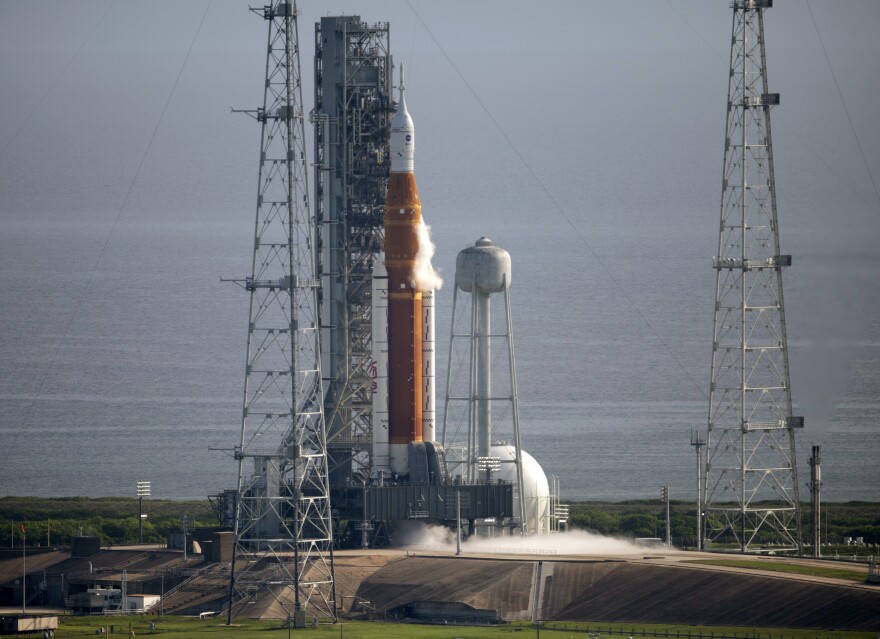Updated September 3, 2022 at 6:48 PM ET
CAPE CANAVERAL, Fla. — NASA has delayed any new launch attempt for the Artemis moon mission until at least Sept. 19 after scrapping a planned launch on Saturday.
The decision on Saturday morning was the second time in a week the launch had been postponed.
The official scrub announcement from Launch Director Charlie Blackwell-Thompson came around 11:19 a.m. ET after several unsuccessful attempts to stop a leak of liquid hydrogen fuel.
Officials announced Saturday afternoon that they wouldn't attempt another launch during the current launch period, which ends on Tuesday. Instead they said the earliest they could try for another launch would be late September.
"We do not launch until we think it's right," NASA Administrator Bill Nelson said.
The space agency's first effort to launch this rocket had to be scuttled on Monday morning after a sensor indicated that one of the rocket's four engines didn't seem to be cooling down to the proper temperature of approximately minus-420 degrees Fahrenheit.
After studying the problem and troubleshooting, officials said it's clear the engine was actually fine and a sensor was giving a false temperature reading. "We know we had a bad sensor," said John Honeycutt, program manager for this rocket at NASA's Marshall Space Flight Center in Huntsville, Ala.
Then on Saturday, as crews worked to fuel up the rocket, they repeatedly detected a liquid hydrogen leak that caused them to stop and start the fueling process several times.
NASA made three unsuccessful attempts to repair the leak before falling so far behind schedule that Blackwell-Thompson ultimately waived off the launch.
Speaking Saturday afternoon, Artemis mission manager Mike Sarafin said the hydrogen transfer line was inadvertently overpressurized but suggested it was too early to tell if that was the cause of the leak.
Officials said they would have to roll the rocket back to the Vehicle Assembly Building unless they could get a waiver to remain on the launchpad until the next attempt.
It wasn't the first time hydrogen leaks have bedeviled efforts to fuel this rocket. Similar ones appeared during dress rehearsals and the first try at launch, though officials described the leak on Saturday as much larger. NASA officials are now studying the problem and discussing next steps.
Artemis comes a half century after the last moon landing
It's been almost 50 years since the space agency last launched a vehicle designed to carry people to the moon. NASA has named its new moon program Artemis, after the twin sister of the Greek god Apollo, and has vowed to put the first woman and first person of color on the lunar surface.
No astronauts will be on board the Artemis rocket during its long-anticipated first mission, but this flight will be a critical test of how NASA's new vehicle will perform in space and during the fiery return to Earth.
Once this rocket successfully lifts off, it will send a crew capsule called Orion on a journey to orbit the moon, coming within about 60 miles of the lunar surface. After more than five weeks, it will return home and splash down in the Pacific Ocean.
The next flight of this rocket will carry people, but it isn't scheduled until 2024. The agency is targeting a 2025 moon landing — although most space watchers expect delays, as this rocket is already years behind its original schedule. Congress had wanted it to fly in 2016, just five years after NASA retired its aging fleet of space shuttles.
Nelson said on Saturday that despite the most recent Artemis 1 delays, NASA was still planning to launch Artemis 2 in 2024 and Artemis 3 in 2025.
Critics say the Artemis program will be too expensive to be sustainable if NASA depends on this rocket and capsule, which come with a hefty price tag. NASA's inspector general has said that each of the first few flights will cost more than $4 billion, and that doesn't include billions of dollars in development costs.
Meanwhile, the private company SpaceX, which currently ferries astronauts to the International Space Station for NASA, is developing its own megarocket and space vehicle called Starship. This rocket is expected to have its first flight soon and is designed to be both reusable and inexpensive. NASA has already said it will rely on SpaceX to develop Starship as a lunar lander, to get its astronauts from lunar orbit down to the surface.
Copyright 2022 NPR. To see more, visit https://www.npr.org.



